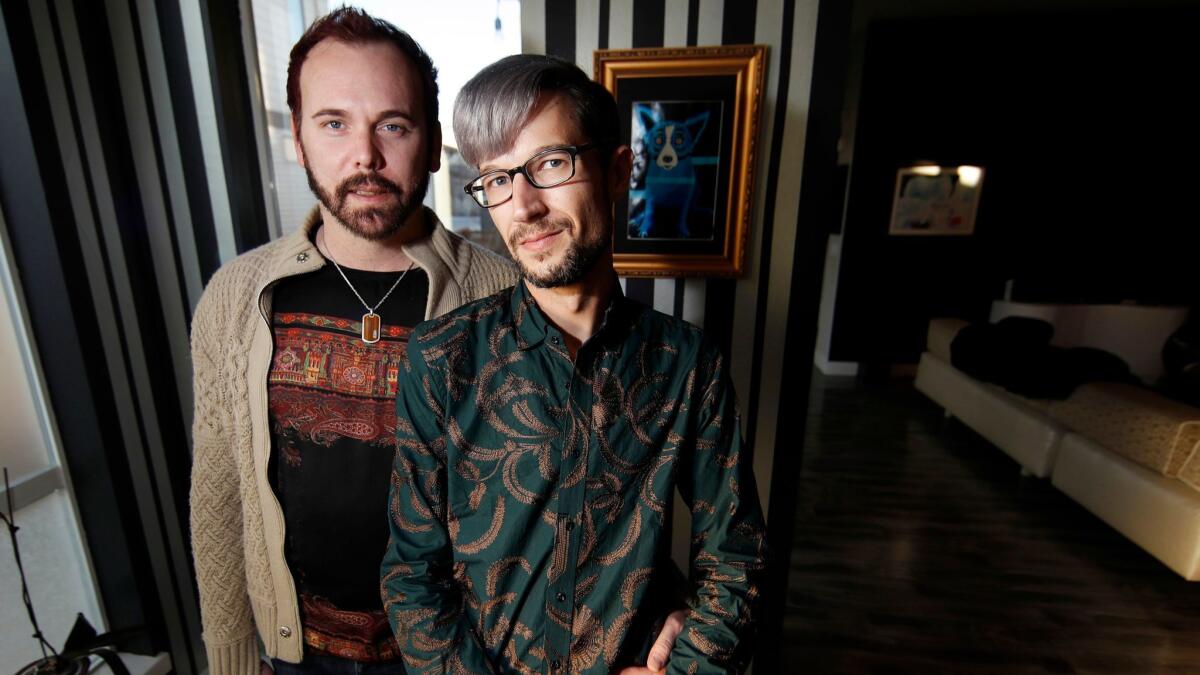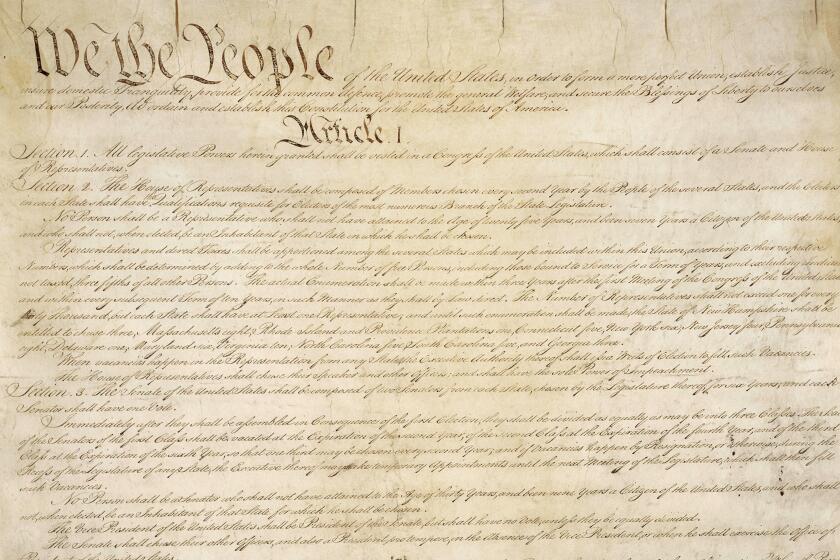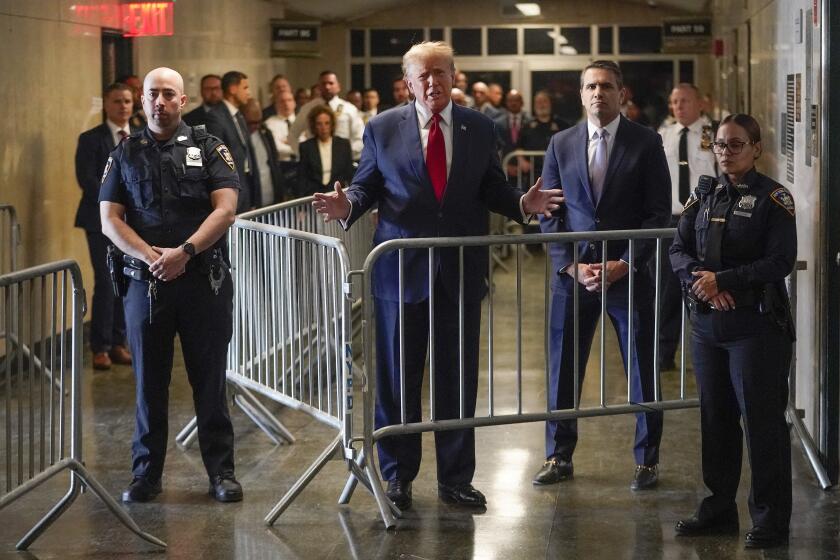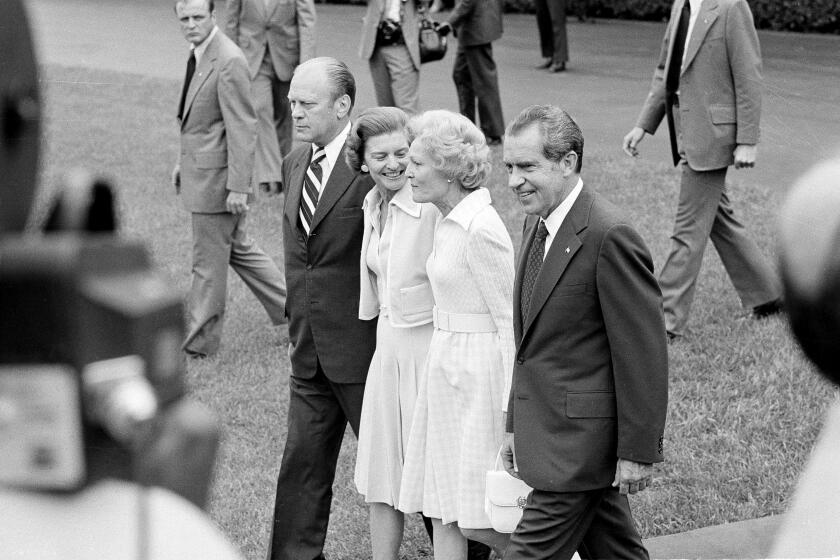Op-Ed: The ‘gay wedding cake’ case isn’t about religious freedom or free speech

This week, the U.S. Supreme Court will hear the case of David Mullins and Charlie Craig, a couple turned away by Masterpiece Cakeshop in Lakewood, Colo., when they tried to buy a wedding cake.
The two weren’t turned away because they couldn’t afford the cake. They weren’t turned away because they were rude. They were turned away because they are gay.
The Colorado courts and the Colorado Civil Rights Commission found that the bakery’s actions violated the state’s law barring discrimination. In the high court, the bakery argues that the lower courts’ findings violate its rights to both religious freedom and free speech.
I’ve watched this argument tangle a lot of good people in knots. But it shouldn’t.
Discrimination by a business should not be protected simply because the refusal is of a service that involves speech or expression.
The bakery’s argument is among the most radical to come before the Supreme Court in recent years. When you scratch below the surface, the case poses the following question: Is there a constitutional right to discriminate?
The bakery argues that there is, and that the Constitution should exempt it from state laws requiring that businesses not discriminate when serving their customers. In an Orwellian twist, the Department of Justice — the very body charged with enforcing the country’s anti-discrimination laws — agreed with the bakery in a friend-of-the-court brief.
Specifically, the bakery argues that it should be allowed to refuse service to people if doing so runs contrary to the religious beliefs of its owners. That should give us pause.
In the 1960s, Piggie Park, a small chain of barbecue restaurants in South Carolina, said that its owner’s freedom of religion would be violated if it were held responsible for disregarding the Civil Rights Act when it refused to serve black patrons.
In 1983, Goldsboro Christian Schools of Goldsboro, N.C., argued it had a religious right to refuse black students. In the same case, Bob Jones University of Greenville, S.C., argued it had a right to deny admission to students who engaged in, or advocated for, interracial dating.
As recently as 1990, Roanoke Valley Christian Schools in Virginia argued that it had a right to pay women less because their faith taught that men should be heads of households.
The courts rejected all of those arguments. They understood that religious liberty does not translate into a right to discriminate. If the Supreme Court now accepts the cake shop’s religion argument, the decision would have far-reaching consequences. Religious liberty could become a way out of anti-discrimination law.
The bakery is also arguing that freedom of speech protects its refusal to serve Mullins and Craig. According to its argument, the 1st Amendment protects its discriminatory conduct because the product it sells is artistic and expressive. Any business engaged in artistic expression can refuse service, they say, not just those motivated by religious beliefs.
But Colorado’s anti-discrimination law pertains to the refusal of service, not the artistry of cakes. It does not tell the bakery how to design its baked goods. It does not compel the bakery or any other business that opens its doors to the public to make a particular product at all. It simply requires that, once a business open to the public chooses to offer a product or service, it cannot refuse to sell that product or service to a customer based on identity.
Consider the question from a different angle. What if, instead of turning the couple away, the bakery posted a sign that said, “Wedding cakes for heterosexuals only”? Those are words, as were “whites only” and “men only need apply.” Though the Constitution protects speech, it does not protect this speech, because it communicates and contains an act of discrimination.
In the bakery’s argument, the cake is the expression, and the Constitution protects its refusal of service because the cake is expressive. Should that act of discrimination be protected simply because the refused service was artistic and expressive? By this logic, the Constitution could protect the right of a hairdresser who refuses to cut the hair of Muslims or a hotel that won’t host an interfaith wedding.
Just as speech by a business open to the public is not protected when it communicates discrimination — “we don’t service your kind here” — discrimination by a business should not be protected simply because the refusal is of a service that involves speech or expression.
If the Constitution exempts the bakery from the law’s bar on discrimination — either because the discrimination is motivated by religion or because it is attached to an expressive service — it would mean that the Constitution protects discrimination. Period.
Today, there is no constitutional right to discriminate. Let’s hope the Supreme Court keeps it that way.
Melling is a deputy legal director of the American Civil Liberties Union.
Follow the Opinion section on Twitter @latimesopinion or Facebook
More to Read
A cure for the common opinion
Get thought-provoking perspectives with our weekly newsletter.
You may occasionally receive promotional content from the Los Angeles Times.






